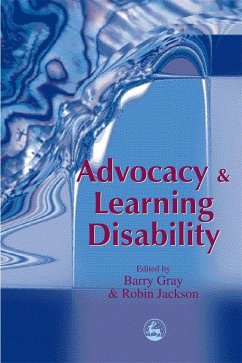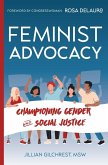Schade – dieser Artikel ist leider ausverkauft. Sobald wir wissen, ob und wann der Artikel wieder verfügbar ist, informieren wir Sie an dieser Stelle.
- Broschiertes Buch
- Merkliste
- Auf die Merkliste
- Bewerten Bewerten
- Teilen
- Produkt teilen
- Produkterinnerung
- Produkterinnerung
This book presents an examination of the historical, legal and philosophical contexts within which advocacy services have developed. It discusses the professional and practical issues and problems confronting those running and using advocacy services, the role of advocacy, and advocacy with families and people with communication difficulties.
Andere Kunden interessierten sich auch für
![Disability and American Philosophies Disability and American Philosophies]() Disability and American Philosophies64,99 €
Disability and American Philosophies64,99 €![Feminist Advocacy Feminist Advocacy]() Jillian GilchrestFeminist Advocacy15,99 €
Jillian GilchrestFeminist Advocacy15,99 €![Disability and The Problem of Evil Disability and The Problem of Evil]() Zachary SchmollDisability and The Problem of Evil17,99 €
Zachary SchmollDisability and The Problem of Evil17,99 €![Civilisation, Its Cause and Cure Civilisation, Its Cause and Cure]() Edward CarpenterCivilisation, Its Cause and Cure15,99 €
Edward CarpenterCivilisation, Its Cause and Cure15,99 €![William James and the Moral Life William James and the Moral Life]() Todd LekanWilliam James and the Moral Life63,99 €
Todd LekanWilliam James and the Moral Life63,99 €![Disability and Disadvantage Disability and Disadvantage]() Kimberley BrownleeDisability and Disadvantage48,99 €
Kimberley BrownleeDisability and Disadvantage48,99 €![End-of-Life Care End-of-Life Care]() End-of-Life Care59,99 €
End-of-Life Care59,99 €-
This book presents an examination of the historical, legal and philosophical contexts within which advocacy services have developed. It discusses the professional and practical issues and problems confronting those running and using advocacy services, the role of advocacy, and advocacy with families and people with communication difficulties.
Produktdetails
- Produktdetails
- Verlag: Jessica Kingsley Publishers
- Seitenzahl: 256
- Erscheinungstermin: 15. Dezember 2001
- Englisch
- Abmessung: 237mm x 159mm x 14mm
- Gewicht: 376g
- ISBN-13: 9781853029424
- ISBN-10: 1853029424
- Artikelnr.: 21114857
- Herstellerkennzeichnung
- Libri GmbH
- Europaallee 1
- 36244 Bad Hersfeld
- gpsr@libri.de
- Verlag: Jessica Kingsley Publishers
- Seitenzahl: 256
- Erscheinungstermin: 15. Dezember 2001
- Englisch
- Abmessung: 237mm x 159mm x 14mm
- Gewicht: 376g
- ISBN-13: 9781853029424
- ISBN-10: 1853029424
- Artikelnr.: 21114857
- Herstellerkennzeichnung
- Libri GmbH
- Europaallee 1
- 36244 Bad Hersfeld
- gpsr@libri.de
Edited by Barry Gray and Robin Jackson
1. Advocacy and learning disability
Barry Gray
King Alfred's College
Winchester and Robin Jackson
Camphill Scotland. 2. Principles and types of advocacy
Jan Walmsley
The Open University. 3. Integrity and advocacy
Michael Kendrick
Independent Consultant. 4. Exploring the role of values in the management of advocacy schemes
Tim Clement
The Open University. 5. Professional consciousness and conflict in advocacy Colin Goble
King Alfred's College
Winchester. 6. The legal context of the advocacy service
Deborah Baillie
The Open University and Veronica Strachan
Robert Gordon University. 7. Thoughts from a UK citizen advocacy scheme
Mike Pochin
Dorset Advocacy. 8. Self advocacy and research
Dorothy Atkinson
The Open University. 9. The role of self advocacy: stories from a self advocacy group through the experiences of its members
Fred Spedding
Elizabeth Harkness
Louise Townson
Andy Docherty
Niall McNulty and Rohhss Chapman
Carlisle People First. 10. The neglected dimension - advocacy and the families of children with learning difficulties
Nick Pike
Annie Lawson School
Berkshire. 11. Advocacy with people with communication difficulties
Janet Scott
Southern General Hospital
Glasgow and Janet Larcher
Independent Consultant. 12. Some observations on the American advocacy scene
Michael Kendrick
Independent Consultant. 13. Better and worse: overview of formal advocacy for people with intellectual disabilities in Australia
Dimity Peter
Flinders University of South Australia. 14. Advocacy - the last frontier in special education? Colleen Brown
Manakau Institute of Technology
Auckland
New Zealand. The Contributors. References. Index.
Barry Gray
King Alfred's College
Winchester and Robin Jackson
Camphill Scotland. 2. Principles and types of advocacy
Jan Walmsley
The Open University. 3. Integrity and advocacy
Michael Kendrick
Independent Consultant. 4. Exploring the role of values in the management of advocacy schemes
Tim Clement
The Open University. 5. Professional consciousness and conflict in advocacy Colin Goble
King Alfred's College
Winchester. 6. The legal context of the advocacy service
Deborah Baillie
The Open University and Veronica Strachan
Robert Gordon University. 7. Thoughts from a UK citizen advocacy scheme
Mike Pochin
Dorset Advocacy. 8. Self advocacy and research
Dorothy Atkinson
The Open University. 9. The role of self advocacy: stories from a self advocacy group through the experiences of its members
Fred Spedding
Elizabeth Harkness
Louise Townson
Andy Docherty
Niall McNulty and Rohhss Chapman
Carlisle People First. 10. The neglected dimension - advocacy and the families of children with learning difficulties
Nick Pike
Annie Lawson School
Berkshire. 11. Advocacy with people with communication difficulties
Janet Scott
Southern General Hospital
Glasgow and Janet Larcher
Independent Consultant. 12. Some observations on the American advocacy scene
Michael Kendrick
Independent Consultant. 13. Better and worse: overview of formal advocacy for people with intellectual disabilities in Australia
Dimity Peter
Flinders University of South Australia. 14. Advocacy - the last frontier in special education? Colleen Brown
Manakau Institute of Technology
Auckland
New Zealand. The Contributors. References. Index.
1. Advocacy and learning disability
Barry Gray
King Alfred's College
Winchester and Robin Jackson
Camphill Scotland. 2. Principles and types of advocacy
Jan Walmsley
The Open University. 3. Integrity and advocacy
Michael Kendrick
Independent Consultant. 4. Exploring the role of values in the management of advocacy schemes
Tim Clement
The Open University. 5. Professional consciousness and conflict in advocacy Colin Goble
King Alfred's College
Winchester. 6. The legal context of the advocacy service
Deborah Baillie
The Open University and Veronica Strachan
Robert Gordon University. 7. Thoughts from a UK citizen advocacy scheme
Mike Pochin
Dorset Advocacy. 8. Self advocacy and research
Dorothy Atkinson
The Open University. 9. The role of self advocacy: stories from a self advocacy group through the experiences of its members
Fred Spedding
Elizabeth Harkness
Louise Townson
Andy Docherty
Niall McNulty and Rohhss Chapman
Carlisle People First. 10. The neglected dimension - advocacy and the families of children with learning difficulties
Nick Pike
Annie Lawson School
Berkshire. 11. Advocacy with people with communication difficulties
Janet Scott
Southern General Hospital
Glasgow and Janet Larcher
Independent Consultant. 12. Some observations on the American advocacy scene
Michael Kendrick
Independent Consultant. 13. Better and worse: overview of formal advocacy for people with intellectual disabilities in Australia
Dimity Peter
Flinders University of South Australia. 14. Advocacy - the last frontier in special education? Colleen Brown
Manakau Institute of Technology
Auckland
New Zealand. The Contributors. References. Index.
Barry Gray
King Alfred's College
Winchester and Robin Jackson
Camphill Scotland. 2. Principles and types of advocacy
Jan Walmsley
The Open University. 3. Integrity and advocacy
Michael Kendrick
Independent Consultant. 4. Exploring the role of values in the management of advocacy schemes
Tim Clement
The Open University. 5. Professional consciousness and conflict in advocacy Colin Goble
King Alfred's College
Winchester. 6. The legal context of the advocacy service
Deborah Baillie
The Open University and Veronica Strachan
Robert Gordon University. 7. Thoughts from a UK citizen advocacy scheme
Mike Pochin
Dorset Advocacy. 8. Self advocacy and research
Dorothy Atkinson
The Open University. 9. The role of self advocacy: stories from a self advocacy group through the experiences of its members
Fred Spedding
Elizabeth Harkness
Louise Townson
Andy Docherty
Niall McNulty and Rohhss Chapman
Carlisle People First. 10. The neglected dimension - advocacy and the families of children with learning difficulties
Nick Pike
Annie Lawson School
Berkshire. 11. Advocacy with people with communication difficulties
Janet Scott
Southern General Hospital
Glasgow and Janet Larcher
Independent Consultant. 12. Some observations on the American advocacy scene
Michael Kendrick
Independent Consultant. 13. Better and worse: overview of formal advocacy for people with intellectual disabilities in Australia
Dimity Peter
Flinders University of South Australia. 14. Advocacy - the last frontier in special education? Colleen Brown
Manakau Institute of Technology
Auckland
New Zealand. The Contributors. References. Index.








